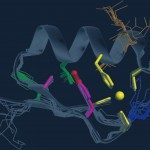Lien vers Pubmed [PMID] – 30736736
Lien DOI – 10.1186/s12866-019-1404-z
BMC Microbiol 2019 Feb; 19(1): 32
Leishmania (L.) spp are intracellular eukaryotic parasites responsible for cutaneous or visceral leishmaniasis, replicating predominantly in macrophages (MF). In C57BL/6 mice virulence with L. amazonensis has been associated with inhibition of Th1 immune responses and an uncontrolled lesion development, whereas DBA/2 mice control any lesion. Parasitic clearance by the MFs requires the activation of proper immune responses. One of the immune related genes expressed in immune cells including MF, codes for osteopontin (OPN). OPN is a secreted glycoprotein, acting as an immune regulator. Its implication in promoting Th1 immunity in response to infectious microorganisms and its known protective effect against viral and bacterial infections via activation of the immune response, render OPN a molecule of interest in the study of the host response to L. amazonensis.We examined the host response to L. amazonensis of opn mutant and wild type C57BL/6 mice. Bone marrow derived MFs were infected with the parasites in vitro, and opn mutant and wild type mice were inoculated in vivo by intradermal injection in the ears. The DBA/2 strain known to control L. amazonensis infection was also used for comparison. Our data indicate that the parasites increased opn gene expression and OPN protein while parasitic proliferation was contained in the presence of OPN. In the presence of parasites the expression of inflammation-related transcripts was inhibited. Interleukin-1-beta (IL-1β), and transcripts of the NLR-family (NLRC4, NLRP3) were down regulated after L. amazonensis infection. In the absence of OPN, the inhibition by the parasites of IL-1β transcripts was less efficient and a pyroptosis-like cell phenotype was detected in vitro, suggesting a central role of OPN in the host-response to L. amazonensis. Similarly, in vivo, in the absence of OPN, while the clinical inflammatory phenotype is more severe, an increase of these transcripts was observed.L. amazonensis infection induces opn gene expression and protein, which in turn participates in shaping the host response to the parasites, seemingly by decreasing the activation of inflammation. OPN, further evaluated as a target for Leishmaniasis control represents an additional interest in improving vaccination strategies against the parasites.



